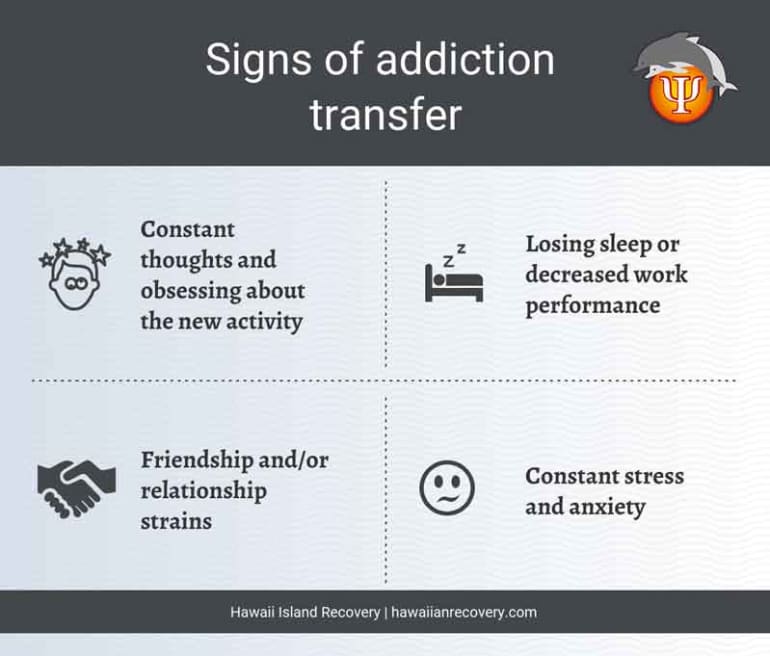Many people have a misconception that people choose one vice and get stuck with that vice until they seek treatment. For people addicted to drugs and alcohol, they feel that the treatment and support they receive will end their addictive behaviors across the board. While drug treatment may help the recovering addict break free from drug addiction, there can be a possibility that addictive behaviors can transfer to other areas.
The transfer of addictive behaviors (also known as addiction transfer) is a common phenomenon, yet it mostly flies under the radar. This occurs because the behavior often shifts to things that are perceived as healthy such as exercise, work and shopping. While these activities are indeed more positive, a recovering addict can be more vulnerable in becoming as emotionally attached to these activities as they were in drinking or taking drugs.
Why the Transfer of Addictive Behaviors Occurs
As with drug addiction, the transfer of addictive behaviors occurs subtlety and people are unaware it is occurring. Addiction transfer often happens because people experience higher levels of stress and anxiety when they are newly sober. When people are getting sober, they realize that the craving they experience has roots in deeper emotional needs and not to the actual substance.
Without substances, those new in recovery experience lower level of dopamine in the brain. When the newly recovering addict feels stress and anxiety, they will more than likely gravitate towards a new (and pleasurable) behavior to relieve that stress. While the new behavior may seem harmless and even healthy, newly recovering addicts can start to develop a compulsion to these newer “vices” in the same way as towards their substance of choice.
Common signs of addiction transfer include the following:
- Constant thoughts and obsessing about the new activity
- Losing sleep or decreased work performance
- Friendship and/or relationship strains
- Constant stress and anxiety
If you or a loved one experiences these symptoms, the most effective way to combat these urges and cravings is through therapy. The most common forms of therapy include the following:

Cognitive-Behavioral Therapy (CBT)
CBT focuses on examining the relationships between thoughts, feelings, and behaviors. By exploring patterns of thinking that lead to self-destructive actions and the beliefs that direct these thoughts, patients can modify their patterns of thinking to improve coping. It is different from traditional psychotherapy in that the therapist and the patient will actively work together to help the patient recover. CBT is problem-focused and goal-directed. Because CBT is an active intervention, one can also expect to do homework or practice outside of sessions, including monitoring and keeping a journal to note negative thoughts as they occur. This allows the patient and their therapist to search for patterns in their thinking that can cause them to have negative thoughts which can lead to negative feelings and self-destructive behaviors.
Eye Movement Desensitization and Reprocessing (EMDR)
EMDR is a process of psychotherapy that seeks to accelerate the healing of a wide range of emotional wounds and self-esteem issues related both to past traumatic events and present life addictions. This interactive approach is often used with people who are suffering from a wide range of presenting complaints, including PTSD and addiction. A typical session will be: The therapist will move his or her fingers back and forth in front of the patient’s face and ask him/her to follow these hand motions with his/her eyes. At the same time, the therapist will have them recall a disturbing event. This will include the emotions and body sensations that go along with it.
Gradually, the therapist will guide him/her to shift their thoughts to more pleasant ones. Some therapists use alternatives to finger movements, such as hand or toe-tapping or musical tones.
People who use the technique and patients who receive this modality believe it weakens the effect of negative emotions. Before and after each treatment, the therapist will ask the patient to rate their level of distress. The goal is that disturbing memories will become less disabling.
Motivational Interviewing (MI)
MI is a goal-oriented, client-centered counseling style for behavior change by helping clients to explore and resolve ambivalence. The examination and resolution of ambivalence is a central purpose, and the counselor is intentionally directive in pursuing this goal.
Motivational interviewing is non-judgmental, non-confrontational and non-adversarial. The approach attempts to increase the patient’s awareness of the potential problems caused, consequences experienced, and risks faced as a result of the behavior/addiction in question. The strategy seeks to help patients think differently about their behavior and to consider what might be gained through change. Motivational interviewing focuses on the present and works with the patient to access motivation to change a particular behavior that is not consistent with their personal value or goal. Warmth, genuine empathy, and acceptance are necessary to foster therapeutic gain within motivational interviewing.
Stop Addiction Transfer Today

The transfer of addictive behavior often goes unnoticed. If it is not caught and addressed, it can lead to destructive behavior patterns that can ruin relationships and friendships and can have negative impacts on work and school. Hawaii Island Recovery features effective therapies that can deal with the cravings and urges head-on and give you the tools you need to become healthier and happier.
Get Help Today!
If you or a loved one need help, call Hawaii Island Recovery toll-free right now.
866-390-5070 Hawaii Island Recovery
Hawaii Island Recovery 










